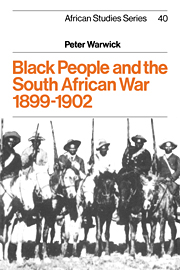Book contents
6 - The war in the Cape
Published online by Cambridge University Press: 21 September 2009
Summary
THE BLACK ELITE
The coming of war between Britain and the Boer republics elicited considerable interest among members of the small, articulate, predominantly mission-educated and politically conscious groups of Africans and Coloureds in the Cape. Members of the black elite prospered as peasant farmers, taught in mission schools or preached as clergymen, or lived and worked in the towns of the colony as traders, craftsmen and journalists, or as interpreters, clerks and messengers in the Cape civil service. Dedicated to education as a means of self-improvement, and seeing their own social progress and achievements in colonial society as an example of the possibilities that were open to their own people, members of the elite embodied many of the traditional virtues of the mid-Victorian age. Small in number though they were, they formed a closely-knit segment of public opinion that was of by no means negligible importance and influence in the colony. Members of the elite were able to bring their point of view to bear on white opinion and the colonial government through letters and petitions to officials and white newspaper editors, through representations to government and political organisations, through the medium of sympathetic white politicians and other ‘friends of the natives’ and through the columns of African newspapers such as Imvo Zabantsundu, Izwi Labantu and, a little later, Koranta ea Becoana, all of which contained sections in both English and the vernacular.
- Type
- Chapter
- Information
- Black People and the South African War 1899–1902 , pp. 110 - 124Publisher: Cambridge University PressPrint publication year: 1983

